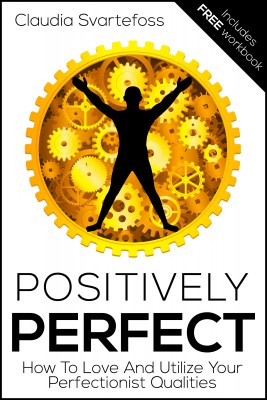Needing perfection
Growing up, I had to be perfect. I had to be the person others expected me to be and behave in the ways others expected me to behave, otherwise I would get punished.
This post contains Amazon affiliate links, meaning I may earn a small commission if you purchase through my links, at no extra cost to you. Note: We aim to provide accurate product links, but some may occasionally expire or become unavailable. If this happens, please search directly on Amazon for the product or a suitable alternative.
This punishment-reward “system” is what’s led to our need to be perfect. Not because we’re crazy or have unreasonably high standards of ourselves, but because there’d be consequences whenever we made mistakes. It’s how we’ve learned to do things. If we do it how it’s expected, we are rewarded, we feel wonderful. If we make a mistake, we are punished, we feel awful.
So we learn to not misbehave, so that we’re not punished, so that we don’t feel negative emotions. We don’t so much learn to behave, and to be rewarded, and to feel positive emotions because our focus, as human beings, has been mainly on negative, on fixing problems.
It’s only logical that we would do anything we possibly could to avoid negative, uncomfortable emotions. They feel bad, that’s their point. They tell us “Stop doing that” – whatever “that” is. But you see, they also tell us “Stop focusing from this negative perspective.” We haven’t used this last part so much, as human beings, and so we learned to avoid things and to believe happiness is the absence of problems.
In reality however, happiness is far more than the absence of problems. But we can’t get to the good part by trying to avoid the bad part. We must direct our focus on the already existing positive things. We must turn our focus on the “reward” part.
Since we’ve evolved and expanded into thinking, emotional beings, we can’t maintain this need to be perfect. Because that’s not what perfect really is. Perfect isn’t doing what others want us to do, or being who others want us to be.
Perfect is being ourselves, feeling empowered, creating our own lives, making our own choices, feeling free and freeing others of this need for misguided control.
We are perfect because we are human beings, because we are a part of our amazing environment. We are perfect because we feel emotion, which lets us know, individually, where we stand in relation to where we want to be. We are perfect because we can choose our focus and our actions.
The fact that many people understand that being perfect in this misunderstood way isn’t a good idea, is our indicator that we’ve defined perfection the wrong way, not that there is something wrong with perfection all together. It’s natural to want to better ourselves, but we want to do it through our natural desire, not in order to avoid negative emotions and consequences enforced by others.
Perfection as an excuse
Working with this flawed definition of perfection (ironic, isn’t it?) has led us to conclude that we can’t attain perfection, even though we try. Today, more than ever, many are choosing to use perfection as an excuse: “Why bother trying, it won’t be perfect anyway.” Just like everything else, our ability to experience contrast can be utilized or misused.
We can understand perfection for what it really is, and we can reach for improvement – this is, in fact, what’s natural to us. But so far, most of us have experienced more negative emotions while reaching for perfection because we haven’t learned to focus deliberately yet. It’s only logical to then associate perfection with a negative experience or negative emotions and declare it’s not worth the trouble.
This, however, happens because we’re focused negatively, not because indeed, reaching for perfection is wrong.
Perfection can also be used as an excuse to not do something one doesn’t want to do. We learned to be people pleasers, to put others ahead of ourselves to the point where we’ve come to feel uncomfortable about saying “no” to things we don’t really want to do. And saying something like “I’m such a perfectionist,” or “I need the perfect conditions to get started” can be an indicator of sincere disinterest in whatever the subject is.
It’s so important to develop better, healthier habits at this point, for example to learn to speak our truth without feeling guilty and to allow others to speak their truth freely. We’ve learned to need to control others because we’ve learned that our happiness utterly depends on them. But now we can start learning to be free, to be ourselves, to let go of the self-blame and guilt and to enjoy the perfect beings we really are. And now we can start learning to allow others to be free, to be themselves, to not need to blame themselves or feel guilty, to enjoy the perfect begins they really are. All the while knowing there is always improvement – and that improvement doesn’t mean the current state is problematic.
Isn’t it perfect that we can, right now, turn our attention toward the well-being in our lives that’s already there, that we’ve been ignoring through our focus on chasing this artificial, misunderstood concept?
Now is the best time to stop blaming perfection, to stop the battle against it. Now is the best time to start understanding what perfection really is and ourselves in relation to it as human beings, and to start enjoying it and our lives to the fullest.
2015 © Claudia Svartefoss
 ‘Positively Perfect: How to Love and Utilize Your Perfectionist Qualities’
‘Positively Perfect: How to Love and Utilize Your Perfectionist Qualities’
Are you a perfectionist?
Do you ever feel like perfectionism is holding you back? This book shows you how to turn your perfectionist qualities into assets to create and enjoy a life you love. Stop procrastinating! Start being an awesome perfectionist now!
“This book does for Perfectionists what Susan Cain’s Quiet did for Introverts. Highly recommended.” -Kevin Kruse, Founder, The Kruse Group, NY Times Bestselling Author, Keynote Speaker, Leadership Expert, Serial Entrepreneur
You can download the book on Amazon for just $0.99 (for a limited time)
 Bestselling author Claudia Svartefoss is a happy, accomplished perfectionist. Even though perfectionism is considered an undesirable flaw, Claudia has found a way to turn her it into an asset. She runs her own business, writes self-development books and coaches her clients toward their success and achieving their goals.
Bestselling author Claudia Svartefoss is a happy, accomplished perfectionist. Even though perfectionism is considered an undesirable flaw, Claudia has found a way to turn her it into an asset. She runs her own business, writes self-development books and coaches her clients toward their success and achieving their goals.
Her passion is sharing her knowledge and experience with others and inspiring improvement, self-love, and love for this amazing environment we all live in. She aims to assist her readers in developing an abundance and well-being based mindset in order to achieve their goals while enjoying themselves and their journey.









